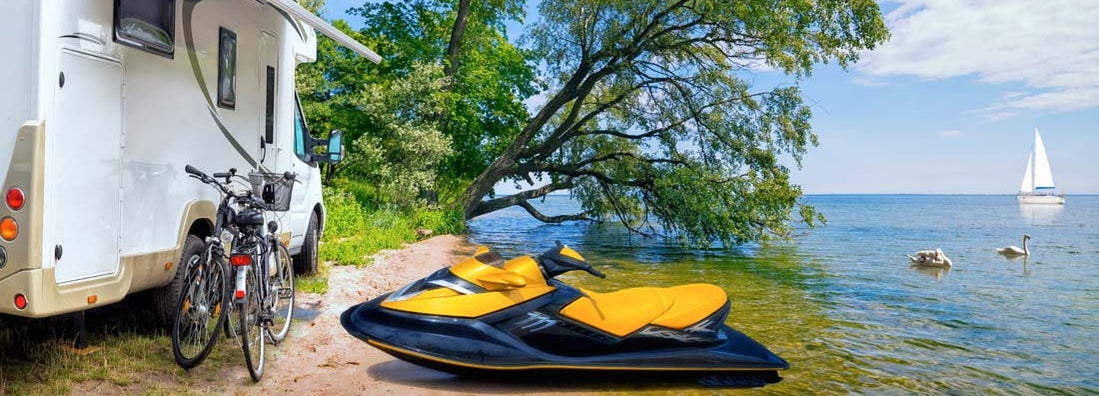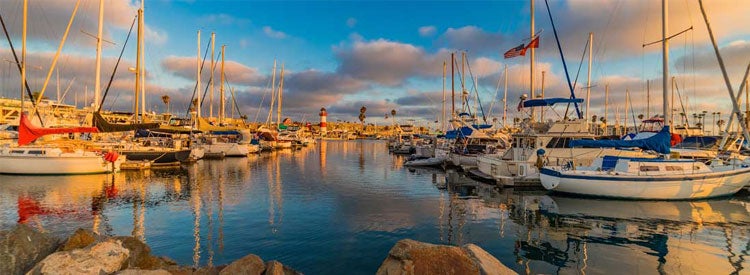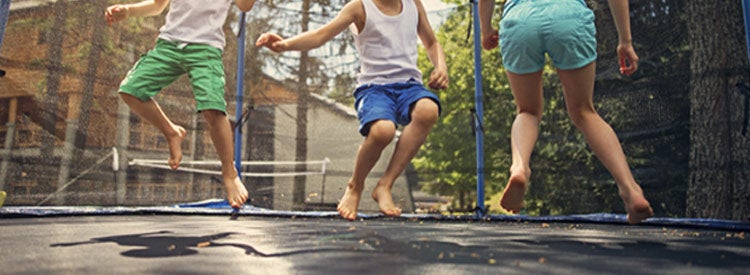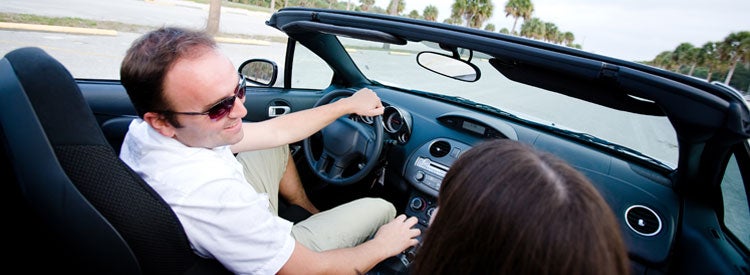Insuring Your Summer Outdoor Fun

When the warmer weather returns, it’s time to get ready for fun in the sun with a variety of outdoor activities. But what happens if someone’s injured as a result of your pool, or if your boat or grill is damaged by a storm?
If you’ve got outdoor toys, watercraft, or vehicles, it’s likely you need some special insurance coverage to make sure you’re protected when something goes wrong.
How to Insure Your Boat

Boat insurance provides vital protection for all kinds of boats, from fishing boats to pontoons, paddleboats, and even yachts. It covers you and the boat in the event of a loss or damage to your boat, or injury or damages to others if you are involved in some kind of an accident.
Some small boats may be covered under your homeowners or renters insurance policy, but the coverage is typically limited to canoes, small sailboats, or small powerboats with less than 25 miles per hour horsepower. Liability coverage for your small boat would typically not be included. Larger, faster boats and personal watercraft like jet skis require a separate policy.
Basic Boat Insurance Coverage
Most boat insurance policies include:
- Collision coverage: This reimburses you for the cost of repairing or replacing your boat due to physical damage.
- Property damage liability and bodily injury liability coverage: This covers you for damage that your boat causes to someone else’s property or injuries that you cause to an individual while operating your boat.
- Comprehensive coverage: This reimburses you if your boat is stolen, vandalized, or damaged in some incident other than a collision.
You can also opt for additional coverage, such as underinsured and uninsured motorist coverage, towing coverage, and coverage for fishing equipment, tools, life preservers, and other personal property aboard your boat.
Boat insurance premiums are determined by the amount of coverage you require and your deductibles. Other cost factors include:
- How often you use your boat
- Where you boat
- Your driving record
- Any previous boat insurance claims
- Any safety courses you have taken
- The horsepower of the boat
- Your age and gender
- The year, make, and model of the boat and motor
- Where you live
Your boat insurance won’t cover everything that could go wrong with your boat. Not every policy is the same, so be sure to review your policy carefully, but most boat insurance policies exclude coverage for:
- Loss caused by wear and tear
- Gradual deterioration
- Weathering
- Insects
- Mold
- Animals and marine life
Additional exclusions may include marring, scratching or denting, osmosis or blistering, manufacturer's defects or defect in designs, and corrosion.
Some boat claims are more common than others. People often need boat insurance and file claims in the following circumstances:
- Your boat is stolen or vandalized
- Your boat sustains weather damage
- You have an accident with another boat
- Someone is injured as a result of being in your boat or your boat causing an accident
How to Insure Your Outdoor Grill

According to the US Fire Administration, around 5,700 grill fires take place every year, causing an average of $37 million in damage, 100 injuries, and 10 deaths. Malfunctioning grills are the largest cause of grill fires.
Basic Grill Insurance
If a grill fire spreads to your house and causes damage, you have coverage under your homeowners insurance policy. Fire is a covered peril under homeowners insurance, so your policy would likely cover:
- Damage to the structure of your home
- Damage to your personal possessions (including the grill)
- Damage to any other insured structures on your property, like the garage or a shed
- Injuries to guests or bystanders
Remember that before your insurance company pays your claim, you’ll have to pay your deductible. If the damage is minimal or doesn’t spread much beyond the grill itself, it may not make sense to file the claim.
How to Insure Your Pool

Having a pool can impact your insurance coverage significantly.
Your pool will likely be covered under your homeowners insurance, but under the “other structures” portion of the policy (the coverage that protects structures like garages or sheds). Permanently installed above-ground pools and most in-ground pools are generally covered by the other structures coverage, but portable above-ground pools that you could take with you if you move are typically covered by the personal property portion of your homeowners policy (the coverage that protects your personal possessions, or the contents of your home).
Homeowners insurance typically helps pay to repair a pool if it's damaged by one your policies covered perils, such as fire and falling objects. That means that if a tree falls on your pool and damages it, you’ll likely have coverage to make the necessary repairs.
Most policies will not cover your pool for damage caused by freezing, thawing, pressure or weight of ice or water. If you live somewhere cold, you must have your pool properly winterized before the cold weather sets in.
For pool owners, liability issues are the true concern from an insurance perspective. Having a pool on your property will definitely increase your home insurance rates, and some insurance companies will not provide coverage at all if your pool has a diving board or slide.
If you have a pool, you need increased liability coverage without fail. You can add higher liability limits to your existing home insurance policy, or you can also buy a personal umbrella policy. Personal umbrellas provide excess liability protection in increments of $1 million, and are recommended for pool owners by most insurance experts.
How to Insure Your Trampoline

Trampolines are complicated when it comes to insurance. First and foremost, trampolines are often considered an “attractive nuisance,” or a dangerous item on your property that children are naturally attracted to, increasing the risk for injuries and liability claims. This automatically makes you responsible for a child’s injuries on your trampoline, even if they used it without your knowledge or permission.
Second, damage to the trampoline itself, and injuries related to the trampoline may or may not be covered by your homeowners insurance, depending on your policy and the legal standards in your state. If you want to buy a trampoline, it’s a good idea to talk to your independent insurance agent before you buy it, so you understand all of the insurance considerations in advance.
Your homeowners policy will likely treat trampoline coverage in one of three ways:
- Trampolines are covered with no exclusions. There are no restrictions on trampoline ownership or usage, and if a visitor or guest is injured on your trampoline, the liability coverage in your homeowners policy may cover the related medical and legal expenses. Or if the trampoline itself is damaged in a storm, your policy may help pay for repairing or replacing it.
- Trampolines are excluded from coverage. If your homeowners policy excludes trampolines from coverage, it would not cover you for any trampoline-related claims, whether for liability or property damage. Some insurance companies with trampoline exclusions may not renew your policy if you purchase a trampoline.
- Trampolines are covered if you take certain safety precautions. Some homeowners policies may provide coverage for a trampoline if you have certain safety precautions in place.
If your homeowners insurance covers trampolines, it still might not be sufficient once you actually add a trampoline to the mix. Before you purchase a trampoline, talk to your independent insurance agent about what your policy covers and if your liability limits are sufficient to cover a serious injury and a lawsuit.
Your agent may suggest that you purchase a personal umbrella policy, which adds additional liability protection for claims that exceed the limits of your homeowners policy.
How to Insure Your Convertible

Insuring a vehicle with a convertible top is no different than insuring a typical vehicle, but it may cost you more and you may have a few other unique considerations.
Convertibles cost more to insure than an average vehicle because they can sometimes be more valuable, and more importantly, because they tend to be stolen and vandalized more than other vehicles, with greater repair costs too.
Most convertible owners choose full coverage auto insurance for their car, meaning they purchase more than just the liability coverage required by the state. If you own a convertible, you’ll likely want comprehensive and collision coverage, too, so you know that you can cover the cost of repairs if you have an accident or if your convertible is damaged by a storm or a falling tree.
All major car insurance companies offer coverage for convertibles. You’ll need to take these factors into account when purchasing your policy, but in general, you should be able to insure your convertible with the same company as any other vehicles you have. You just might need to purchase some additional coverage and pay a little more for your convertible insurance.
